Brood en Spelen
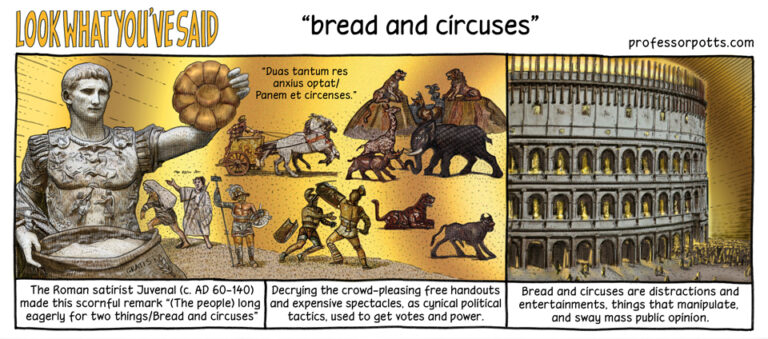
Page Description
Discover the historical and contemporary significance of
‘bread and circuses,’
examining its role in society’s distractions
and entertainments throughout the ages.
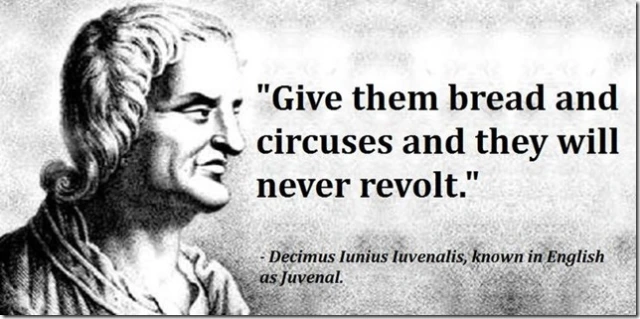
Activities or official plans that are intended to keep people happy and to stop them from noticing or complaining about problems
Cambridge Dictionary
Something, as extravagant entertainment, offered as an expedient means of pacifying discontent or diverting attention from a source of grievance.
Iets, zoals extravagant vermaak, aangeboden als een handig middel om ontevredenheid te sussen of de aandacht af te leiden van een bron van grief.
Bread and Circuses: The Illusion of Contentment
The phrase “Bread and Circuses” originates from ancient Rome, where it described how rulers maintained control over the populace: by providing free food and grand spectacles to distract citizens from political and social issues. Today, this concept resonates in a world saturated with entertainment and consumerism, often at the expense of justice and meaningful discourse.
On this page, we explore the enduring relevance of “Bread and Circuses” through text and video, examining how distractions shape societies and limit individual freedoms. Featured here is Michael Sandel’s thought-provoking lecture, ‘Justice: What’s The Right Thing To Do? Episode 03: “FREE TO CHOOSE,” which delves into the ideas of John Stuart Mill and challenges us to rethink the balance between liberty, happiness, and societal well-being.
Are we truly free to choose – or have we been pacified by the modern-day equivalent of bread and circuses?
Brood en Spelen: De Illusie van Tevredenheid
De uitdrukking “Brood en Spelen” stamt uit het oude Rome, waar het beschreef hoe machthebbers controle over het volk behielden: door gratis voedsel en grootse spektakels te bieden om de aandacht af te leiden van politieke en sociale problemen. Tegenwoordig is dit concept nog steeds relevant in een wereld die wordt overspoeld door entertainment en consumentisme, vaak ten koste van rechtvaardigheid en zinvolle discussie.
Op deze pagina verkennen we de blijvende betekenis van “Brood en Spelen” aan de hand van tekst en video, en onderzoeken we hoe afleidingen samenlevingen vormen en individuele vrijheden beperken. Hier vindt u onder andere de prikkelende lezing van Michael Sandel, ‘Justice: What’s The Right Thing To Do? Episode 03: “FREE TO CHOOSE,” waarin hij ingaat op de ideeën van John Stuart Mill en ons uitdaagt om het evenwicht tussen vrijheid, geluk en maatschappelijk welzijn opnieuw te overdenken.
Zijn we echt vrij om te kiezen – of zijn we gekalmeerd door het moderne equivalent van brood en spelen?
“Bread and Circuses” is a concept that refers to the provision of superficial satisfaction to distract people from more significant, pressing issues. Here are the key points:
Distraction from Real Problems: The phrase originates from ancient Rome, where rulers used free food (bread) and entertainment (circuses) to divert the attention of the populace from socio-political issues or inequalities.
Superficial Fulfillment: It symbolizes how authorities offer trivial or momentary gratification to appease the public instead of addressing deeper problems or grievances.
Manipulation of Masses: It highlights the use of entertainment and basic needs to control or manipulate public opinion, preventing unrest or rebellion by keeping people occupied and content with temporary pleasures.
Social Control Mechanism: It serves as a means of social control, where powerful entities use distractions to maintain their status quo, ensuring that people remain passive and untroubled by deeper societal issues.
The phrase “bread and circuses” remains relevant in discussions about politics, media, and societal control, emphasizing the tactics used to placate or divert attention rather than addressing substantive issues.
Justice: What’s The Right Thing To Do? Episode 03: “FREE TO CHOOSE”
Gepubliceerd op 8 sep. 2009
To register for the 2015 course, visit https://www.edx.org/course/justice-ha….
PART ONE: FREE TO CHOOSE
Sandel introduces the libertarian conception of individual rights, according to which only a minimal state is justified. Libertarians argue that government shouldnt have the power to enact laws that 1) protect people from themselves, such as seat belt laws, 2) impose some peoples moral values on society as a whole, or 3) redistribute income from the rich to the poor. Sandel explains the libertarian notion that redistributive taxation is akin to forced labor with references to Bill Gates and Michael Jordan.
PART TWO: WHO OWNS ME?
Libertarian philosopher Robert Nozick makes the case that taxing the wealthy—to pay for housing, health care, and education for the poor—is a form of coercion. Students first discuss the arguments behind redistributive taxation. Dont most poor people need the social services they receive in order to survive? If you live in a society that has a system of progressive taxation, arent you obligated to pay your taxes? Dont many rich people often acquire their wealth through sheer luck or family fortune? A group of students dubbed Team Libertarian volunteers to defend the libertarian philosophy against these objections.
Michael Sandel – Harvard University – Justice: What’s the right thing to do?
Please click to enjoy this course by Michael Sandel at Harvard University.
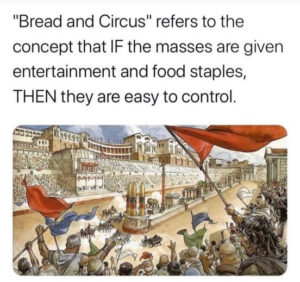
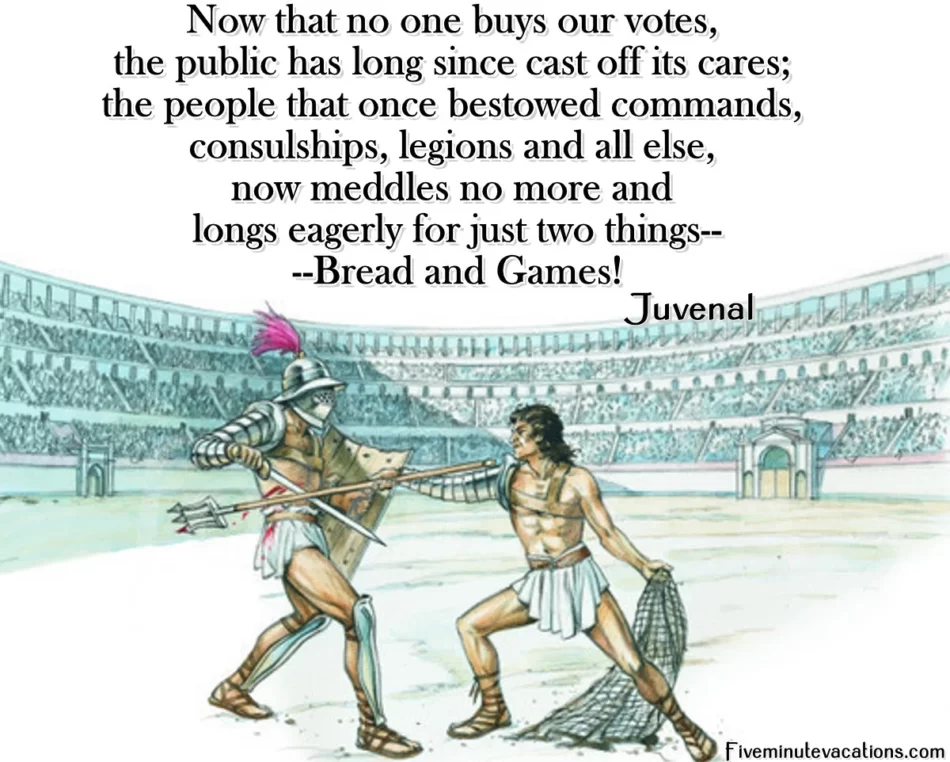
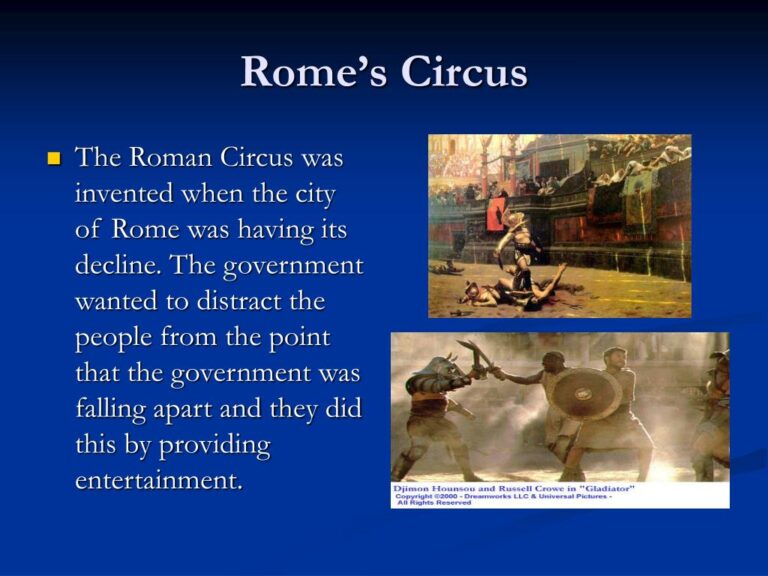
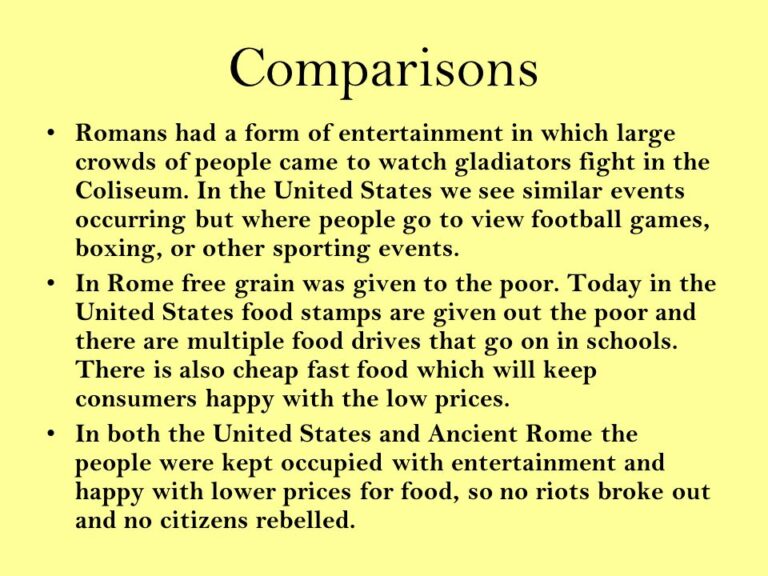
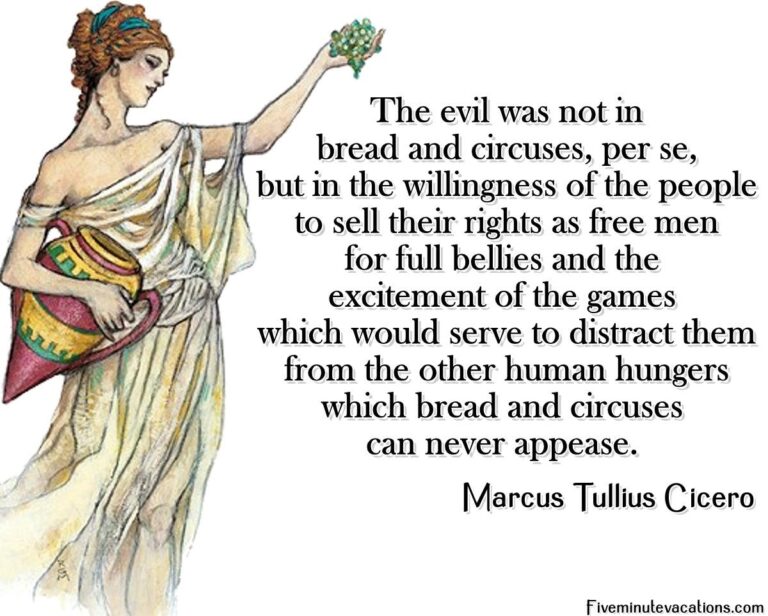
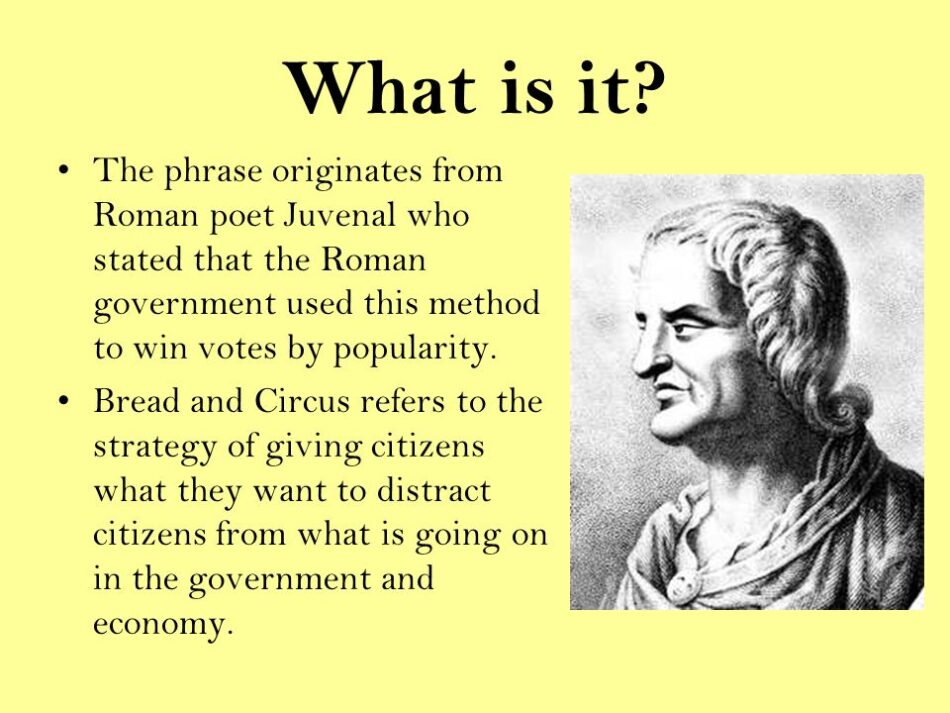
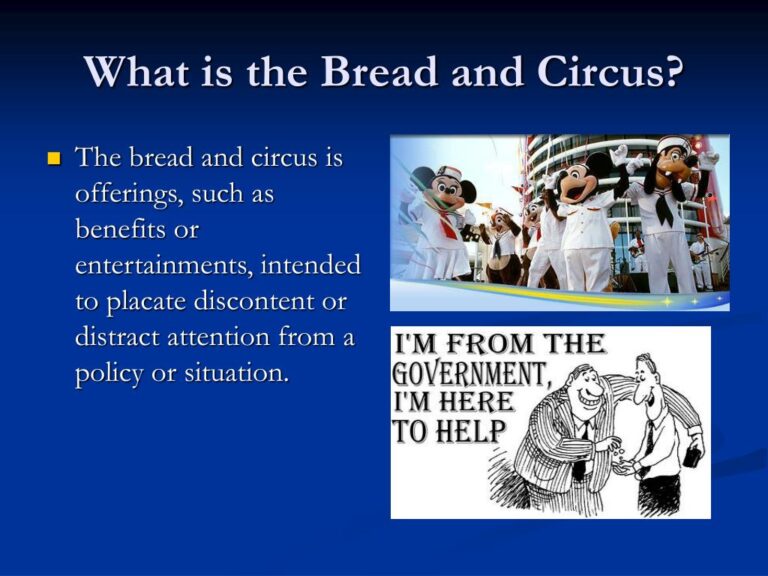

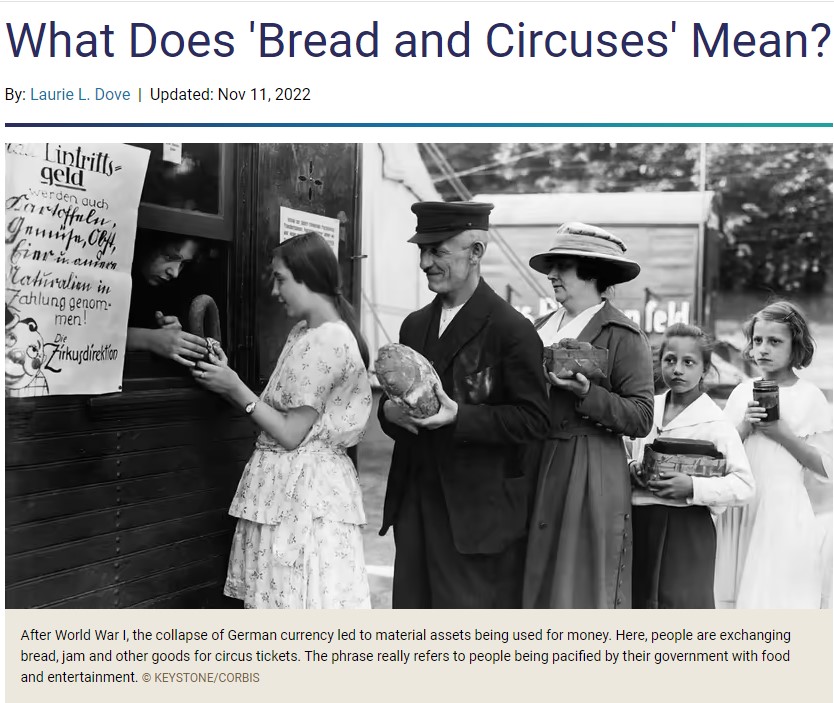
The idea that people can be pacified by food and entertainment when they should be rallying to their prescribed civic duties isn’t a new one. In fact, the concept was first described in ancient times by the satirical Roman poet Juvenal, who penned the Latin term panem et circenses, which means “bread and circuses.”
“Two things only the people anxiously desire — bread and circuses,” he wrote, lamenting the failure of citizens to take action as the democratic Roman Republic fell and the heavy-handed Roman Empire began.
Within a mere 100 years, Rome underwent massive governmental changes. What in 133 B.C.E. was a free republic that relied on a voting populace and an assembly system morphed into an embittered autocracy by the first century C.E. [source: Beard].
Thus, Juvenal’s term, “bread and circuses” went viral, used by scores of people — then and now — to describe people who voluntarily trade their democratic freedoms in exchange for stable-yet-controlling government.
Back then, the Roman government kept the Roman people pacified by offering them free food and rousing entertainment in the Roman Colosseum. Now, “bread and circuses” applies to any civic or governmental entity — or any situation, really — in which the masses willingly accept short-term solutions to ease their discontent.
The “bread and circuses” concept is also a fitting descriptor for Dominant Ideology. Dominant Ideology is a Marxist construct exemplified by the idea that economically disadvantaged classes will accept that it’s their fate to remain so [source: Purdue].
It’s possible that the moral of the story is one of independence — in thought, action and economics. And especially when it comes to the Roman Colosseum.
Het idee dat mensen gekalmeerd kunnen worden door eten en vermaak terwijl ze zich zouden moeten inzetten voor hun voorgeschreven burgerplichten is niet nieuw. Het concept werd voor het eerst beschreven in de oudheid door de satirische Romeinse dichter Juvenal, die de Latijnse term panem et circenses schreef, wat “brood en spelen” betekent.
“Twee dingen waar alleen het volk naar verlangt — brood en circus,” schreef hij, en hij betreurde het falen van de burgers om actie te ondernemen toen de democratische Romeinse Republiek ten onder ging en het hardhandige Romeinse Rijk begon.
Binnen slechts 100 jaar onderging Rome enorme regeringsveranderingen. Wat in 133 voor Christus een vrije republiek was die vertrouwde op een stemgerechtigde bevolking en een assembleesysteem veranderde in een verbitterde autocratie in de eerste eeuw voor Christus [bron: Beard].
Juvenal’s term “brood en spelen” ging dus viraal en werd door veel mensen gebruikt — toen en nu — om mensen te beschrijven die vrijwillig hun democratische vrijheden inruilden voor een stabiele maar controlerende regering.
In die tijd hield de Romeinse regering het Romeinse volk rustig door hen gratis eten en opzwepend amusement aan te bieden in het Romeinse Colosseum. Nu is “brood en spelen” van toepassing op elke burgerlijke of overheidsinstantie – of eigenlijk op elke situatie – waarin de massa bereid is om kortetermijnoplossingen te accepteren om hun ontevredenheid te sussen.
Het “brood en spelen” concept is ook een passende omschrijving voor de Dominante Ideologie. Dominante Ideologie is een marxistische constructie die wordt geïllustreerd door het idee dat economisch achtergestelde klassen accepteren dat het hun lot is om zo te blijven [bron: Purdue].
Het is mogelijk dat de moraal van het verhaal er een is van onafhankelijkheid — in denken, handelen en economie. En vooral als het gaat om het Romeinse Colosseum.
Is this another post office scandal happening today? The Post Report, Hard to Place full podcast.
5 mrt 2024
The Post Report: stories from the post office network – HARD TO PLACE FULL PODCAST
Post Office Ltd is facing another backlash after its decision to cut long-serving Hard to Place (HtP) subpostmasters leavers payment by more than half, for those affected by the end of the Network Transformation programme in March 2025. Critics are calling the latest move the new Post Office scandal and are questioning what happened to the supposedly-ringfenced money given to the Post Office by the Government at the end of the Network Transformation programme.
The NFSP has produced a podcast where NFSP Chief Executive Calum Greenhow, along with Hard-to-Place postmasters Sue Bruce and Barry Vara speak about the issues they currently face.
We Reveal The Secret To Making Great Orange Juice
18 mrt 2020
Like all great things in life, the secret is hard work and a little sweat… Okay, a lot of sweat.